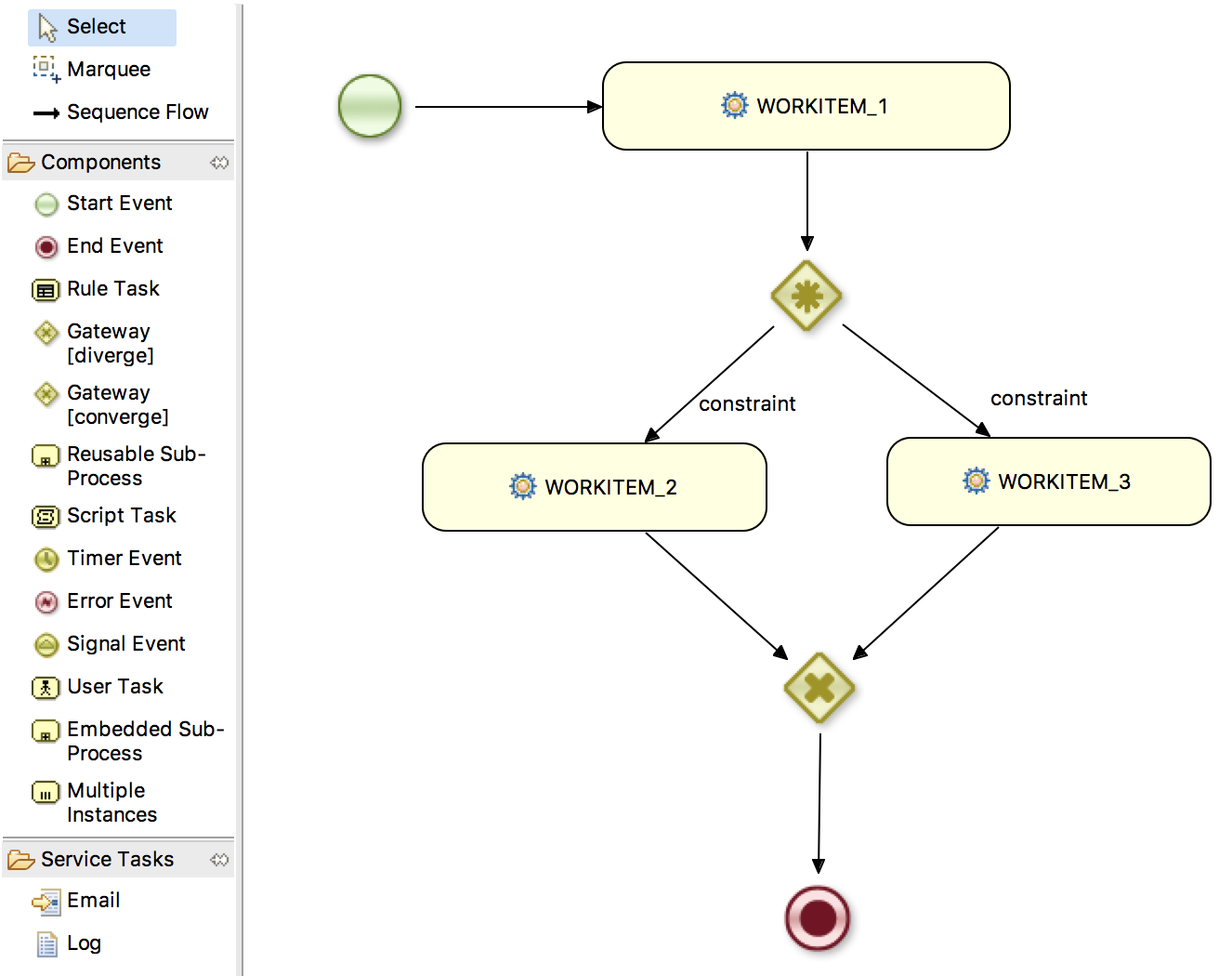MtiTekFlow
|
About jBPM
-
References
The documentation of jBPM can be found in:
jBPM Documentation 7.28.0.Final
jBPM JavaDocs 7.28.0.Final
-
Using jBPM plugins in Eclipse
You can install the jBPM plugins in Eclipse using the folowing URL: http://downloads.jboss.org/jbpm/release/latestFinal/updatesite/
Among the available plugins, you will use the Eclipse editor for creating BPMN2 processes.

Also you may be interested to create a jBPM project using the assistant plugin that can create an empty project, a sample project, or even download existing projects from jBPM online repository.
-
jBPM unit testing
You can add the jBPM-test module to your maven project:
<dependency> <groupId>org.jbpm</groupId> <artifactId>jbpm-test</artifactId> <version>7.28.0.Final</version> <scope>test</scope> </dependency>
Here's a sample unit test code, generated by the jBPM plugin:
public class ProcessTest extends JbpmJUnitBaseTestCase { @Test public void test() { final RuntimeManager runtimeManager = createRuntimeManager("sample.bpmn"); final RuntimeEngine runtimeEngine = getRuntimeEngine(null); final KieSession kieSession = runtimeEngine.getKieSession(); final ProcessInstance processInstance = kieSession.startProcess("com.sample.bpmn.hello"); assertProcessInstanceCompleted(processInstance.getId(), kieSession); assertNodeTriggered(processInstance.getId(), "Hello"); runtimeManager.disposeRuntimeEngine(runtimeEngine); runtimeManager.close(); } }
You can look at thejbpm-testsource code (jbpm-test-7.28.0.Final-sources) where you will find some sample codes that will help you understand how jBPM works.
The main class you may be interested to look at is:org.jbpm.test.JbpmJUnitBaseTestCase
For example if you are interested to see an example of how to create an instance of theorg.kie.api.runtime.manager.RuntimeEnvironmentBuilder:
RuntimeEnvironmentBuilder builder = RuntimeEnvironmentBuilder.Factory.get().newEmptyBuilder() .addConfiguration("drools.processSignalManagerFactory", DefaultSignalManagerFactory.class.getName()) .addConfiguration("drools.processInstanceManagerFactory", DefaultProcessInstanceManagerFactory.class.getName()) .registerableItemsFactory(new SimpleRegisterableItemsFactory() { @Override public Map<String, WorkItemHandler> getWorkItemHandlers(RuntimeEngine runtime) { Map<String, WorkItemHandler> handlers = new HashMap<String, WorkItemHandler>(); handlers.putAll(super.getWorkItemHandlers(runtime)); handlers.putAll(customHandlers); return handlers; } @Override public List<ProcessEventListener> getProcessEventListeners(RuntimeEngine runtime) { List<ProcessEventListener> listeners = super.getProcessEventListeners(runtime); listeners.addAll(customProcessListeners); return listeners; } @Override public List<AgendaEventListener> getAgendaEventListeners(RuntimeEngine runtime) { List<AgendaEventListener> listeners = super.getAgendaEventListeners(runtime); listeners.addAll(customAgendaListeners); return listeners; } @Override public List<TaskLifeCycleEventListener> getTaskListeners() { List<TaskLifeCycleEventListener> listeners = super.getTaskListeners(); listeners.addAll(customTaskListeners); return listeners; } });
If you are interested to see an example of how to create an instance of theorg.kie.api.runtime.manager.RuntimeManager:
protected RuntimeManager createRuntimeManager(Strategy strategy, Map<String, ResourceType> resources, RuntimeEnvironment environment, String identifier) { try { switch (strategy) { case SINGLETON: if (identifier == null) { manager = managerFactory.newSingletonRuntimeManager(environment); } else { manager = managerFactory.newSingletonRuntimeManager(environment, identifier); } break; case REQUEST: if (identifier == null) { manager = managerFactory.newPerRequestRuntimeManager(environment); } else { manager = managerFactory.newPerRequestRuntimeManager(environment, identifier); } break; case PROCESS_INSTANCE: if (identifier == null) { manager = managerFactory.newPerProcessInstanceRuntimeManager(environment); } else { manager = managerFactory.newPerProcessInstanceRuntimeManager(environment, identifier); } break; default: if (identifier == null) { manager = managerFactory.newSingletonRuntimeManager(environment); } else { manager = managerFactory.newSingletonRuntimeManager(environment, identifier); } break; } return manager; } catch (Exception e) { if (e instanceof BitronixSystemException || e instanceof ClosedChannelException) { TransactionManagerServices.getTransactionManager().shutdown(); } throw new RuntimeException(e); } }
You can also use the following methods to assert some conditions related to your unit testing:
-void assertProcessInstanceState(long processInstanceId, Integer expectedState, String message)
-void assertNodeActive(long processInstanceId, KieSession ksession, String... name)
-void assertNodeTriggered(long processInstanceId, String... nodeNames)
- ...
-
jBPM DDL scripts
You can download the jBPM DDL scripts from github:
► https://github.com/droolsjbpm/jbpm/tree/master/jbpm-installer/src/main/resources/db/ddl-scripts
Here are the paths where you can find the jBPM DDL scripts for each supported database:
-
db2
-
derby
-
h2
-
hsqldb
-
mysql5
-
mysqlinnodb
-
oracle
-
postgresql
-
sqlserver
-
sqlserver2008
-
sybase
-
db2
© 2025
mtitek